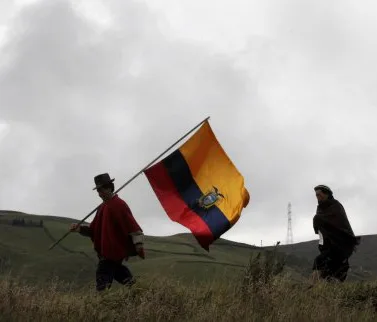Natives of Ecuador’s Intag Valley oppose open pit mine pushed by the government; opposition leader is jailed, charged with terrorism
By Grégory Salomonovitch and Caroline Pothie
The communities living in Intag Valley in northern Ecuador have been opposing attempts to introduce an open-pit copper mine for 20 years.
Such a mine would endanger one of the world’s richest areas in terms of biodiversity, known as cloud forest, part of which is old-growth forest.
These unique ecosystems are home to rare and endangered animal and plant species.
As early as 1995, the region’s 17,000 inhabitants held firm against the Japanese mining company BishiMetals and, in 2008, managed to expel the Canadian corporation Ascendant Copper.
But since 2012 they have been faced with a new adversary. Following the agreement concluded by the state-owned mining company ENAMI-EP and CODELCO, the Chilean copper giant, it is now the Ecuadorian government, headed by President Rafael Correa, that wants to lay its hands on the precious metal to fund government projects.
Following this line, the Ecuadorian president, re-elected for a third time in 2013, has opened up copper, gold and silver exploration to foreign investors.
Junín, nested at the bottom of Intag Valley, is at the heart of the Llurimagua mining project concession area. The tension in this small village of 260 inhabitants is palpable.
The community is divided into two camps, those in favor of the mine and those against it. “We avoid each other, and when our paths cross we clash. Our friends have become our enemies, even though we used to be really close,” laments 60-something Carmencita, a local activist who has spent a third of her life fighting against mining companies.
The tension erupted between the villagers in May 2014, when ENAMI-EP employees arrived in the valley escorted by the police.
More than a hundred police officers have since set up headquarters in this tropical region of the Andes, officially to “keep the peace”.
Javier Ramírez, the head of the Junín community, is paying dearly for the government’s determination to muzzle any opposition.
He has been in detention since April 10, 2014 and is still awaiting trial.
The state-owned mining company has brought charges of “terrorism, rebellion and sabotage” against him, accusing him of provoking acts of vandalism against ENAMI-EP employees wishing to enter the mining project area.
“But Javier was at home. He had hurt his knee and couldn’t walk!” says his cousin, Marcia Ramírez, condemning the tactics being deployed to intimidate those opposing the mining project.
The impact of this arrest has been fast and effective. “People are afraid of protesting now. We don’t know what is going to happen, it’s all political,” added Marcia Ramírez.
In Junín, the pro-mine camp is not vocal and the Equal Times team is sent to talk to Óscar Ortiz.
Oscar “is able to talk”. It is not clear what his official status is, but he has been chosen by the state-owned company to persuade his fellow villagers to accept the mining project.
There is talk of $600 a month for taking part in the “socialization” process. That is two times higher than the minimum wage in Ecuador.
Oscar does not deny the rumor.
Money is what has made most of the villagers decide in favor of the mine.
The police stationed in the village are lodging with those who have chosen to support the project. It is an easy and relatively good source of income for families who often have no other means of survival, other than their small plots of land.
On November 28, 2014, authorities approved the environmental impact assessment for the proposed mining project.
The exploration phase, which begins this year and will last between six and eight years, will allow the company to determine whether there are sufficient copper resources to make the project viable and to launch operations.
Diego Zambrano, the person in charge of presenting the assessment on behalf of the ENAMI-EP, recognizes that: “All human activity has an impact on the environment. But this is a strategic choice that has now been made by the Ecuadorian state, which has already planned to invest $5 million to improve the public infrastructure in the region.”
Zambrano quotes Correa, that Ecuador cannot be a beggar sitting on a sack of gold.
The environmental protection organisation Defensa y Conservación Ecológica de Intag (Ecological Defence and Conservation of Intag – DECOIN), has denounced numerous irregularities in the assessment, carried out in just ten days – but to little affect.
Aside from the importance of preserving this unique environment, the fight against the government’s projects has become a symbol in Ecuador. The symbol of disillusion.
In 2007, after Rafael Correa was first elected, mining concessions had been suspended or cancelled, raising great hopes among the communities in the remote regions of the country.
“When Correa won, we thought we had been saved,” recalls Marcia Ramírez.
“But Correa has changed and now all he wants is to exploit all our natural resources. It is a terrible let-down. We voted for him, we believed in him, and now we want him to go,” she concludes, bitterly.
Credit: Equal Times, www.equaltimes.org; Photo credit: Associated Press






















